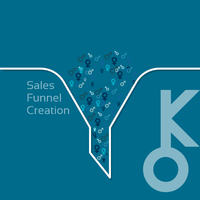Predictive Analytics in Sales Funnels
Sales funnels have long been used by businesses to guide potential customers through the buying process. However, with advancements in technology and data analytics, the future of sales funnels is now shifting towards predictive analytics.
Predictive analytics refers to the use of historical data, statistical algorithms, and machine learning techniques to predict future outcomes. In the context of sales funnels, predictive analytics can provide businesses with valuable insights into customer behavior and help optimize their sales processes.
Benefits of Predictive Analytics in Sales Funnels
The integration of predictive analytics into sales funnels offers several key benefits:
Improved Lead Generation: Predictive analytics allows businesses to identify and target high-quality leads more effectively. By analyzing past customer data, businesses can determine which characteristics or behaviors are indicative of a strong lead. This enables them to focus their efforts on finding similar prospects who are more likely to convert into paying customers.
Enhanced Personalization: With access to detailed customer data, businesses can personalize their marketing messages at every stage of the sales funnel. Predictive analytics helps identify specific customer needs and preferences, allowing for tailored interactions that are more likely to resonate with individuals. This level of personalization not only increases engagement but also improves conversion rates.
Optimized Sales Conversion: By leveraging predictive models, businesses can gain insights into which actions or touchpoints within their sales funnel have the highest impact on conversion rates. This information allows for strategic optimization of the funnel structure and messaging delivery to maximize conversions and revenue generation.
Effective Cross-selling and Upselling Opportunities: With predictive analytics in play, businesses can anticipate additional products or services that may be relevant to a particular customer based on their past behavior or preferences. This enables targeted cross-selling or upselling strategies that result in increased average order values and customer satisfaction.
Real-time Decision-making: Predictive analytics can provide businesses with real-time insights into customer behavior, trends, and purchase patterns. This allows for agile decision-making and immediate response to changes in the market or customer preferences. Businesses can adjust their sales funnel strategies quickly to capitalize on emerging opportunities or address potential issues promptly.
Implementing Predictive Analytics in Sales Funnels
To leverage the power of predictive analytics within sales funnels, businesses need to follow certain steps:
Data Collection: Gather relevant data from various sources such as customer interactions, website analytics, social media engagement, and previous sales records. The more comprehensive and accurate the data set, the more effective predictive analytics will be.
Data Analysis: Cleanse and analyze the collected data using statistical techniques and machine learning algorithms. Identify patterns, correlations, and trends that may indicate future customer behavior or potential bottlenecks within the sales funnel.
Model Development: Develop predictive models based on historical data to forecast future outcomes at each stage of the sales funnel. These models should be regularly updated as new data becomes available for more accurate predictions.
Continuous Optimization: Regularly assess the effectiveness of your sales funnel using key performance indicators (KPIs) such as conversion rates, average order value, and customer retention rate. Fine-tune your predictive models and make necessary adjustments to improve overall funnel performance.
Integration with CRM Systems: Integrate predictive analytics tools seamlessly into existing Customer Relationship Management (CRM) systems for streamlined data analysis and automated decision-making processes.
Conclusion
The future of sales funnels lies in harnessing the power of predictive analytics technology. By utilizing historical data and advanced algorithms, businesses can gain valuable insights into customer behavior that enables them to optimize their marketing efforts across all stages of the sales funnel.
Through improved lead generation strategies, enhanced personalization tactics, optimized conversion techniques, and dynamic cross-selling/upselling opportunities, Predictive analytics empowers businesses to make data-driven decisions in real-time, resulting in increased revenue, customer satisfaction, and overall marketing effectiveness.
















